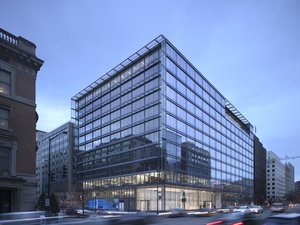Cvent. Event Farm. Nvite. Social Tables.
San Francisco might have EventBrite, but, overnight, it seems that D.C. has become the place to be for event and hospitality technology startups alike.
Some started in D.C. by chance. Like Event Farm, which was started by two Georgetown alums who made the career switch from politics to technology. Or Social Tables, which stuck around after founder Dan Berger finished his MBA from Georgetown in 2010.
But nvite's Martin Ringlein thinks the bigger question is why they all popped up around the same time, circa 2010.
"I think D.C. is quick to find gaps and close them really well. We're really good at seeing opportunities in the market," Ringlein said. "And in event technology you can just see this moment come in 2012 where a lot of people just got frustrated."
Before that year, it seemed that the only big event technology company in the DMV was Cvent, which was founded in 1999. Think about it: SimpleTix started in 2009. EventFarm launched in 2010. And nvite and InGo.Me came to town in 2013. That's not even the full list.
"In San Francisco, there's a talent war where you're fighting for the same kinds of talent," Ringlein said. "In D.C. it's a little bit more diversified and people are more interested in trying new things, so it's easier to get someone to leave their full-time job and join a startup."
And of course, there's the plethora of D.C. events that makes event technology an obvious innovation of choice for D.C. entrepreneurs.
"Networking is a critical part of how D.C. functions and innovating is part of how D.C. functions," Ringlein said. "A lot of that is ingrained in the DNA of how people live around here."
Berger, Social Tables founder and CEO, agrees and also notes that a lot of startups, whether they be in the hospitality or event management space, are here coincidentally.
"I think if you trace the history of why all of these companies are here, they've all got different reasons—many of them are coincidental," he said. "And a lot of event technology companies are here, and that's because a lot of people in D.C. go to a lot of events, and they're probably always looking for ways to improve them and that's probably why they started here."
Berger also notes that having hospitality giants like Marriott, Hilton and Starwood in D.C. has helped his company develop its own network — whether in establishing a network of users or in hiring a handful of employers.
"Every industry has a D.C. connection—they have an office here, they have a lobbying arm here, they have an association that represents their industry here. But for hospitality, this is the capital of hospitality," Berger said. "Thirty-five percent of all the rooms in the world are managed by companies that are headquartered here. Marriott, Starwood and Hilton are all here. So there is that network, as well."
I've lived in other areas of the world where they don't have that vibe at all.
Brian Ludwig, the senior vice president of sales for Cvent who has been with the company since 2000, said the size of the D.C. tech community also helped Cvent grow. The company went public in 2013, and it was recently acquired by Vista Equity Partners, allowing them to go private once more. Since starting in 1999, Cvent raised nearly $137 million in venture capital, before going public.
And that's partially why Ludwig thinks Cvent was successful. If they had launched in San Francisco or other larger technology hubs, they would've gotten lost in the vacuum, Ludwig says.
That, and Cvent was in an events hub city already.
"With associations and nonprofits and so many of them being headquartered here, many of them are in the events world," he said.
When Aron Kansal started SimpleTix in 2009, he was living in Prague. It didn't have the same entrepreneurial vibe. In fact, Kansal said it had an anti-entrepreneurship vibe. Prague's lack of co-working spaces and incubators made the decision for Kansal to move back to D.C. to nurture his event ticketing business.
"It's a great environment just because of everything from the great coworking spaces to the entrepreneurship vibe that's in the area, it's really positive," Kansal said. "And I've lived in other areas of the world where they don't have that vibe at all and it really is hard to start a business."
One thing he wishes he could change about D.C.: the cost.
"Washington, D.C. is extremely expensive. If you want to go out for lunch, you're looking at $15," he said. "It's not a cheap place to start a company, and it is hard to get some of the alliances in Washington, D.C. There is kind of two sides to it."
Event Farm's Ryan Costello told DC Inno back in early November that his company is proud to be a part of a seemingly growing and accidental event technology hub.
"What's interesting about D.C., of any center for event technology, D.C.'s it. You've got Social Tables, InGo, us, nvite, Cvent," he said. "There are a lot of event technology companies doing really well in D.C.
"I don't know where that came from, but I think it's a lot of coincidence. But there's a hub now, and we're proud of that and want to be a part of it."
So, now that D.C. has its event tech players, what's next? Ringlein says he thinks that D.C.'s startups are good at knowing when to scale their companies, which is good when considering the long-term growth of the industry.
"We're good about starting up in the garage, but we're also good about staying there," he said. "We can stay small and nibble. Everybody can maintain teams that are pretty small."
So, with that, he sees the event tech "hub" becoming more synergized in the future.
"I believe we'll see a handful of groups work more closely together over the next year or two as everyone matures and more clearly determines their strength and market niche," he said.
"I also think you'll start seeing a lot of innovation locally as it relates to events as these startups look to local businesses to run and test their ideas and grow their platform. You already see everyone from Marriott to José Andrés trying new things in the event space using local leaders like Social Tables and nvite."
Image used via CC BY-SA 4.0 — credit Dashanchia




